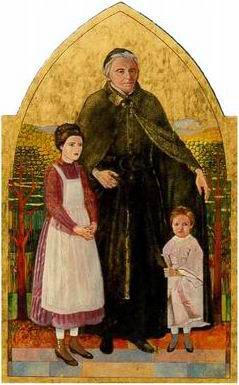St Luigi Scrosoppi

Italian priest and founder of the Sisters of Providence. Luigi was born on 4 August 1804, at Udine in Italy, the youngest of three sons of Domenico Scrosoppi, a jeweller and his wife Antonia Lazzarini. His brother Carlo was ordained when Luigi was six, and his brother Giovanni several years later. When he was 11 or 12 years old, Luigi's home region was struck by drought, famine, typhus, and smallpox in quick succession. The sight of such misery, complete poverty, and the number of orphans had a lasting effect on him.
In his teens, Luigi felt a call to the priesthood, and entered the same seminary as his brother Giovanni. He became deacon in 1826 and was ordained priest in 1827 at the cathedral in Udine; assisted at his first Mass by his brothers. Luigi helped manage a children's centre run by his brother Carlo. As the numbers of children coming to stay grew, they both went begging on the streets in order to buy food for them.
Soon there were more orphans than space and the brothers decided to enlarge the house. Luigi went through the countryside to beg for building materials and labour.
Work began in 1834 with Luigi coordinating, begging, supervising, and working construction. The centre was completed in 1836. That year also saw another cholera epidemic, and more and more orphaned children came to live with them.
The need of the orphans, and the constant work of the brother priests, attracted the attention of several women who were also working with the poor and the abandoned.
Among them were Felicita Calligaris, Rosa Molinis, Caterina Bros, Cristina and Amalia Borghese and Orsola Baldasso. These women, under the spiritual direction of Carlo and Luigi, founded what would become the Congregation of Sisters of Providence who taught basic academic subjects and needlework. Luigi placed them under the patronage of Saint Cajetan, and the Congregation received final approval in September 1871 by Pope Pius IX.
In 1846 Luigi joined the Oratory of Saint Philip Neri, a congregation devoted to charity and learning. He was elected provost of the community in November 1856. On 4 October 1854 he finished work on the Rescue Home for abandoned girls.
On 7 March 1857 he opened the school and home for deaf-mute girls. He also opened Providence House for his unemployed former students, and worked in the hospitals with the sickest and poorest of patients.
In his later years, Luigi had to deal with the anti-clericalism that swept through Italy during unification. Many houses and groups, including the Oratory, were closed, and their assets sold off. While he could not save the Oratory or parish property, he did protect his charitable institutions, and saw the Congregation grow and spread.
Luigi died on 3 April 1884 at Udine. He was canonised on 10 June 2001 by Pope John Paul II, after the miraculous cure of an AIDS patient from Zambia was attributed to him.
Peter Changu Shitima, a young catechist had been told by doctors that his case was terminal. His parish community prayed for the intercession of Blessed Luigi, and on the night of Oct. 9, 1996, Changu went to bed and dreamed of Blessed Kuigi. He woke up in the morning completely recovered.












